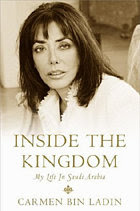There are a lot of social issues that I feel passionate about, but the one I am picking (arbitrarily based on the books laying around at my house at the time of writing) is women's rights. Yes, I'm a feminist, but in all honesty, women in the United States have it pretty good when compared to women in many other countries in the world.
 I got Inside the Kingdom for my birthday last year and I read it from start to finish in one sitting. This riveting book was written by Carmen bin Ladin (does that last name ring a bell?) Although she grew up in Europe and spent a lot of time in America, she fell in love with a Saudi Arabian man, who happened to be a brother of Osama bin Ladin. They got married in Saudi Arabia, where she then lived for a number of years.
I got Inside the Kingdom for my birthday last year and I read it from start to finish in one sitting. This riveting book was written by Carmen bin Ladin (does that last name ring a bell?) Although she grew up in Europe and spent a lot of time in America, she fell in love with a Saudi Arabian man, who happened to be a brother of Osama bin Ladin. They got married in Saudi Arabia, where she then lived for a number of years.Her story of what life is like to be a woman in Saudi Arabia is chilling. In Saudi Arabia, most freedoms that women enjoy around the world are non-existent. Women can't go outside without a full veil called an abaya, and not without a male escort. They may not speak to anyone else in public. Even when out, there is little that Saudi women are encouraged to do.
"There were no books. There were no theaters, no concerts, no cinemas. There was no reason to go out, and in any case we could not go out: I was not allowed to go for a walk, and legally could not drive."
Even indoors, women cannot socialize with any men aside from their husband or immediate male relatives. Women in Saudia Arabia are completely dependent on their male relatives. When Carmen was pregnant, she notes that:
"Longing for a boy was not just a whim... it is a question of basic survival. In the event of a husband's death, if his wife has only daughters, then the wife and girl children - even if they are adult - become dependent on the husband's closest male relative. He is their guardian, and must approve even basic decisions, such as travel, or education, or the choice of a husband."
When she tries to distract herself from the tedium of her life in Saudia Arabia by tackling a redecorating project at her house, Carmen encountered a host of problems:
"Shopping for furnishing was almost impossible: There were no shops.... Then, how to carpet the house? Because I could not be seen or spoken to by the male workers, I had to assume that they knew their craft and rely on (a male secretary) to direct the team."
After spending three days cloistered in another part of the house while the workers fail to install the carpet correctly several times, Carmen finally goes out to order them around directly. "They would not look at me. I told them to tear out the carpeting again. They would not listen to me. The Sudanese worker who was laying down more carpeting simply laid down some more. I repeated myself. I raised my voice. Finally he turned his head slightly, still not facing me. "I do not take orders from women," he growled."
I can't imagine living in a country where social norms are so such that workers fixing my own house with my own money would openly refuse to obey. My own personal encounters with sexism absolutely pale in comparison.
Carmen bin Ladin writes a personal story that is thought-provoking, sad at times, and yet optimistic. Undoubtedly, sharing her story about what life is like for women in Saudi Arabia was the ultimate act of rebellion for her. I can't recommend this one highly enough.
 I have not read Waris Dirie's entire book yet, but I did read a section of it in Reader's Digest, and it piqued my interest (and indignation). Waris was born in Somalia, and at the age of five, was forced by her mother to undergo female genital mutilation. (Follow the link for details, but I warn you it isn't pretty). FGM is a practice common in certain parts of Africa. It is hard to imagine justification for a practice that at best leaves young girls mutilated for life, if they survive the "surgery" (often carried out with little more than a rusty knife). However, it is considered necessary in order for a woman to be eligible for marriage.
I have not read Waris Dirie's entire book yet, but I did read a section of it in Reader's Digest, and it piqued my interest (and indignation). Waris was born in Somalia, and at the age of five, was forced by her mother to undergo female genital mutilation. (Follow the link for details, but I warn you it isn't pretty). FGM is a practice common in certain parts of Africa. It is hard to imagine justification for a practice that at best leaves young girls mutilated for life, if they survive the "surgery" (often carried out with little more than a rusty knife). However, it is considered necessary in order for a woman to be eligible for marriage.After Waris was offered in marriage to a 61-year-old man in exchange for 5 camels, she ran away from home. She found her way to London, where she became a model and later an advocate against FGM. She wrote this book to tell her story and educate people about the truth of this terrible practice. Gosh, I really need to go pick up this book now. I'm feeling the need for my daily dose of righteous indignation.
I'm sure there are a multitude of other great books on this topic, so I will ask you: do you know of other ones I should really read? Please recommend!


10 comments:
Wonderful post, Kim! I'm adding both those books to my wish list. Thank you!
What a great post Kim..Both books sound like must reads and I'll put them both on my wishlists. It's so unfortunate that these things actually exists in the world...disgusting really and what's even more disgusting is that they tie it all to religion. FGM has always been so disturbing to me and I don't understand how anybody can honestly find that to be a justifiable practice. It's enraging. Great topic here.
The Storyteller's Daughter by Saira Shah talks a little about the treatment of women in Afghanistan--Shah is a British reporter of Agfhan decent. It was required reading for our college freshman (when I taught) a few years ago.
Great post, Kim. I. Cannot. Imagine!! Both of these books sound like must reads. I'll be adding them to my TBR list. Thanks for bringing them to my attention!
debi-hope you do, they are both must-reads!
chris-I completely agree with you. It is so sad to think that these things go on, and it is hard to imagine why. I hope you find them both to be engaging reads!
trish-thank you for recommending that one. I just added it to my list!
kristi-I do hope you find them to be good reads.
Great post, Kim!
I truly agree and I can imagine how difficult their life is with all the restrictions. It makes us to be more grateful in life and not to take things for granted.
What a great post!! This is such a great Weekly Geeks because it shows so much passion. Loved it!
great post, Kim. FGM is a subject that is horrendous. That any culture could even have invented it makes me wonder about the human race and power, sometimes. I'm glad you brought up a good book for reference. same with the bin laden book, which must have taken great courage for her to write also, given the associations with her brother-in-law's name. I'm not sure I could understand a society like that, if the underlying assumption is that women can't be trusted, or men that can't be trusted, but it's sad that women are the ones who have to hide themselves away. Again, basic power. You certainly made us all think, which I think was the purpose of this weekly geek!
I've added these to my TBR list! Thanks so much.
I also suggest you add "Infidel" by Ayaan Hirsi Ali to your list. Ali was also born in Somalia, she then lived in Kenya and Saudi Arabia for a time before being married off to a man in Canada. On her way to Canada she had a layover in Germany, which she took as her opportunity to run away. She went to school to receive her masters in Political Science and now spends her time speaking out about the oppression of women in Muslim countries. Her life is fascinating and her life has been threatened because of her work so I say she deserves all the support she can get!
melody-yes, it definitely makes me feel more grateful for the things I have! Freedom is easy to take for granted.
stephanie-thanks :-)
susan-I can't agree more! It is so sad that entire cultures are built on treating women as second class citizens. And when you've grown up your entire life without any power, rebelling is going to be the last thing on your mind! So sad.
becca-thanks for recommending that one! I will definitely add it to my wishlist. It sounds like a pretty amazing book!
Post a Comment